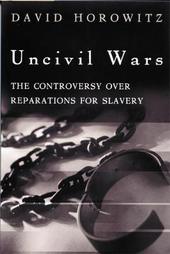
|
Uncivil Wars: The Controversy over Reparations for Slavery
Paperback / softback
Main Details
| Title |
Uncivil Wars: The Controversy over Reparations for Slavery
|
| Authors and Contributors |
By (author) David Horowitz
|
| Physical Properties |
| Format:Paperback / softback | | Pages:139 | | Dimensions(mm): Height 220,Width 162 |
|
| Category/Genre | Slavery and abolition of slavery |
|---|
| ISBN/Barcode |
9781893554719
|
| Classifications | Dewey:305.896073 |
|---|
| Audience | |
|---|
|
Publishing Details |
| Publisher |
Encounter Books,USA
|
| Imprint |
Encounter Books,USA
|
| Publication Date |
15 May 2003 |
| Publication Country |
United States
|
Description
In this well-researched and carefully argued book, David Horowitz traces the origins of the reparations movement. He examines the case made by its advocates and concludes that it is 'morally questionable and racially incendiary'. He notes that only a tiny minority of Americans ever owned slaves; and most Americans living today (white and otherwise) are descended from post-Civil War immigrants who have no lineal connection to slavery at all. More intriguingly, he also points out that the GNP of black America is so large that it makes the African American community the tenth most prosperous 'nation' in the world. But this book is more than just an in depth casebook on the hot button issue of reparations. In the hope of initiating a dialogue, Horowitz originally presented a summary of his ideas on this subject in the form of an advertisement that appeared in several college newspapers and was rejected by many more. Editorialists in America's leading papers and several chapters of the American Civil Liberties Union weighed on Horowitz's side. With the assistance of Richard Poe, Horowitz uses the response to the reparations issue to show how the new racial orthodoxy collides with the free speech battle and what its implications are for American education and culture.
Author Biography
David Horowitz is the author of Radical Son, The Politics of Bad Faith, Left Illusions, and other books. He is the President of the Center for the Study of Popular Culture in Los Angeles, California.
Reviews"Horowitz . . . is certainly correct that there is a problem of political correctness on many college campuses. . . . Some divisive ideas--particularly about race and gender--are unwelcome by administrators, faculty members and students in many colleges and universities." "Horowitz sees . . . the reparations movement is motivated not primarily by a concern for justice. It exists instead to denigrate America's founding ideals--ideals that contributed to slavery's end--and to perpetuate a sense of race-based entitlement and victimhood that harms blacks today far more than does the legacy of slavery."
|